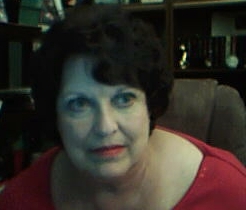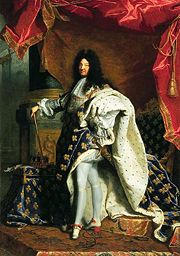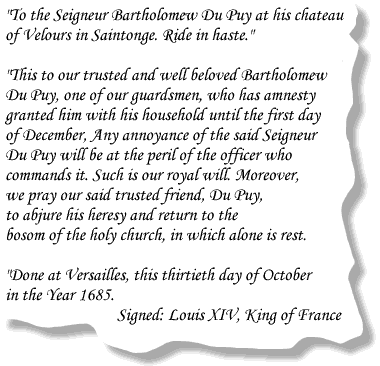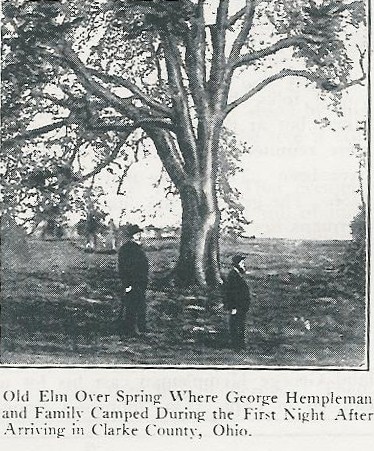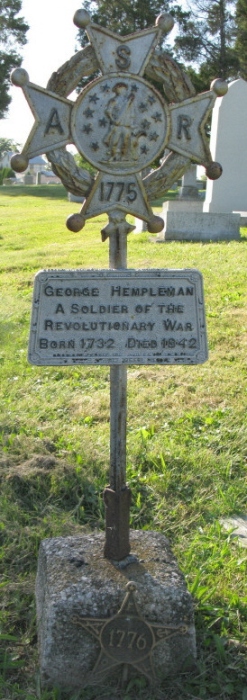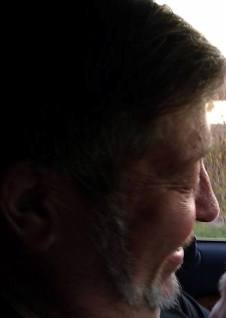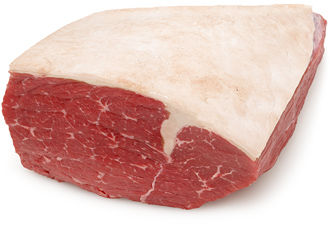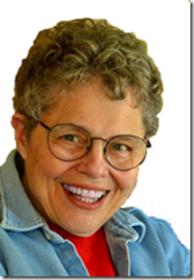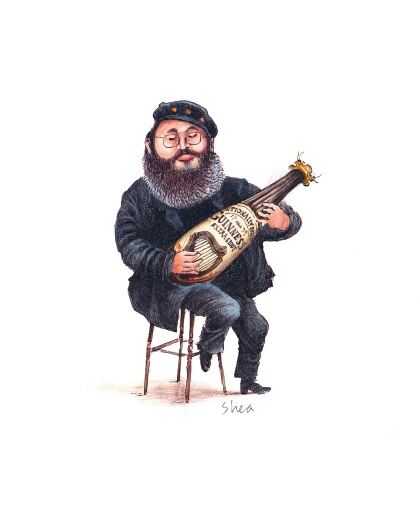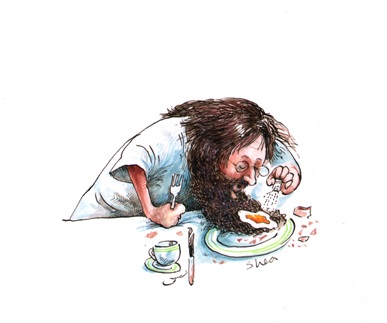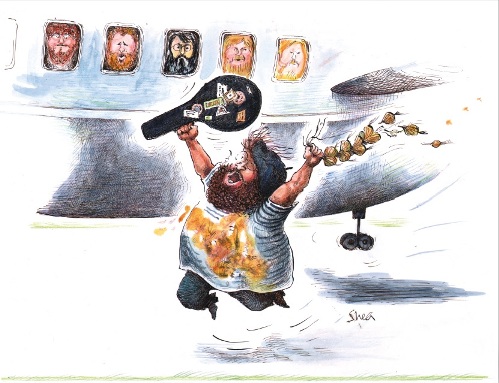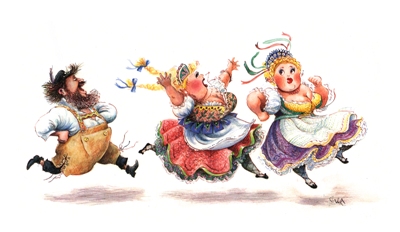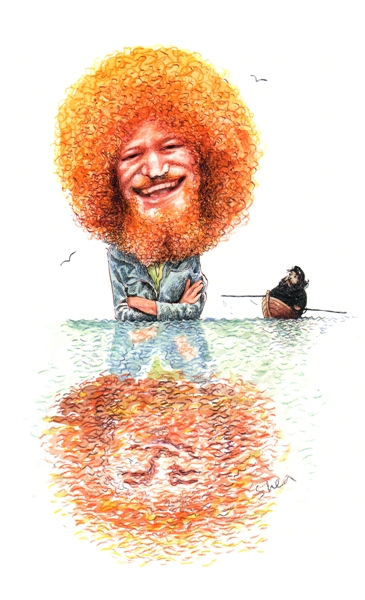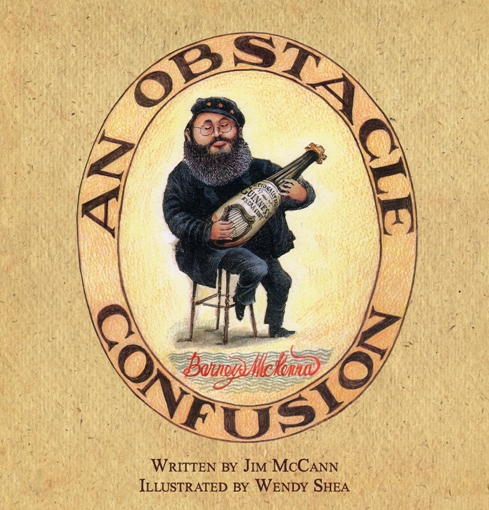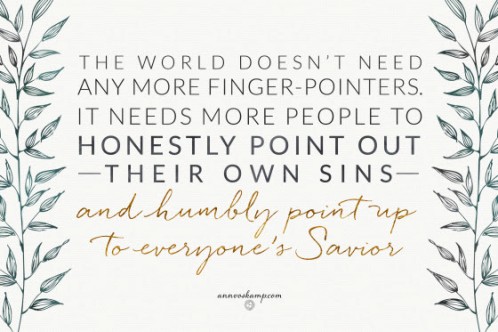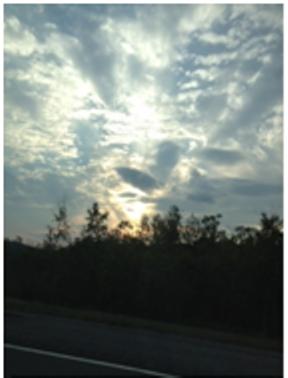Chapter Five
Tatiana’s Journal
My name is Tatiana. I hope that you who are reading this are a
descendant of mine, and that you have made a happy life for yourself and
your loved ones. It is not an easy task, I know. If I had a family coat
of arms to bequeath to you, its motto would be “Life is not easy, nor
joy free.” But I would also add this: "Love is the most precious thing."
I was born in Moscow in 1855 to Emeraude-Marie Romanov and Daniel
Shlomo Lelko. From early childhood I learned the value and cost of
love. Both my parents were disowned by their families – she for
“consorting with a Jew” and he for loving a woman who was not a Jew.
They became each other’s family, and they were blessed with the
strength, courage and talent to make a far more satisfying life together
than either could have had, had they obeyed their families.
An only child, I grew up pampered by my parents and by their many
kind and generous friends. My mother was soft-spoken but strong. She
was also beautiful, had the voice of a nightingale and the vision of an
artist. She was my father’s true companion, looking never back to what
she had given up but always forward to what they would accomplish
together. While she could have been a performer or painted for
commissions, she chose to make her life her art. Joy filled our home,
peace and security in the knowledge of my parents’ mutual devotion and
fidelity.
My father was a truly gifted musician. Whether with reed, strings
or piano, he could flood a listener’s soul with beauty. Cast out from
the Jewish community, he was accepted by others because of his talent
and gentle wit. We lived well in a spacious house in the city, a gift
from one of his patrons.
Emeraude had flaxen hair and violet-blue eyes, wore pastel colors
and lace. Even when I was grown up, she had kept her willowy figure.
She loved to work in our garden, and her kitchen produced feasts the
Czar himself would have praised whether she was entertaining my father’s
patrons, friends and neighbors, or just the three of us. She wore
around her neck a golden chain from which she had removed a cross when
she left her parents’ house. The cross she gave to her brother’s wife,
who remained her steadfast friend.
Papa had bright auburn hair, as I did when I was young, and the
same moss-green eyes. He was a well-educated man, far more intelligent
than many of the wealthy he worked for. Perhaps this is just a loving
daughter’s opinion, but Papa seemed comfortable in any company and
always made others feel comfortable as well. This was a gift of his that
my mother taught me is the truest form of courtesy, the essence of good
manners. He was always kind, generous and fair.
Because of the unique social position my parents had earned, I
was raised almost like a nobleman’s daughter. I learned needlework and,
of course, the piano. I was also happy working in the garden with my
mother and climbing trees with the stable boys, but my parents hired
tutors so I would learn mathematics, history and science. I can’t
remember a time when I did not know how to read and write, and I grew up
speaking French and Russian at home. In spite of himself, Papa taught
me bits of Yiddish, mostly exclamations of dismay and words I should not
use before company.
I learned to ride horses when I was very, very young. Some of
Papa’s wealthy friends were amazed that I showed no fear, and it amused
them to watch little Tati, with her flaming hair, riding a pony as if I
had been born on one. As I grew, the horses became larger, too. Some of
the ladies were slightly scandalized when they realized that a
fifteen-year-old girl was riding astride like a boy, but attempts to
make me change to a sidesaddle were abandoned when I somehow kept
falling off. Propriety was not so important, after all, for “Lelko’s
little girl.” It was not as if I were destined to be a lady.
Mama designed special riding garb for me – a split skirt that the
French call culottes. They were quite satisfactory, though not as
practical as the trousers I could wear while I was a child, and the
ladies reluctantly approved. No one could have known what an important
role horses would play in my life.
Our home was a wonderful place filled with art, music and
conversation. Among my parents’ friends were poets, writers, painters,
musicians and intellectuals who reveled in the mutual respect and
curiosity that were part of the very air we breathed. The privileges of
“Lelko’s little girl” were also enjoyed by Lelko’s friends. Mama and
Papa created an atmosphere around them that encouraged questions and
debate. Books were everywhere. Life was filled with possibilities. The
ideal of freedom was tempered only with the importance of accepting the
consequences of one’s actions.
It was heaven for a girl who hungered to know “why.” I had a
remarkably happy childhood, and it was supposed – I guess – that I would
one day find a suitable mate among the children of our friends. But
that was not what happened.
After I’ve told you how idyllic my childhood was, how
compassionate and understanding my parents were, you must wonder that I
could have left them as I did. Looking back over all these years, I can
only conclude that they taught me too well to follow my heart.
The trouble began, if I could identify its beginning in
relationship to the early part of my life, with a horse. There is a
saying you’ve probably heard: “Don’t look a gift horse in the mouth.”
Good advice, perhaps, but I would not have done anything differently.
For my eighteenth birthday, one of Papa’s patrons – a duke, I
believe – decided to make a gift to me of my very own riding horse.
“Lelko’s girl,” no longer so little, would have her very own
thoroughbred mare from no less than the finest stables in eastern
Europe. He presented me with letters of credit and introduction to Carl
Eduard Josef Albrecht Baron von Willensky, whose horses were known for
their soundness, strength, grace and presence.
Spoiled as I was, I was dumbstruck by the generosity of the gift.
But Papa sided with his great friend and said to me, “Tati, don’t be
rude. Accept this lovely gift and make this kind man happy.”
And so it was that I traveled alone by rail and coach from Moscow
to Vilnius. The duke had arranged first-class accommodations for me,
and the soft leather seats and fine wood paneling made the coaches seem
like drawing rooms on wheels. But the trip was a long one and tiring. I
was not used to sitting still for very long, and there was not much to
do besides read and watch the scenery. I chatted with some of the ladies
in the dining car and avoided the uninvited attentions of several men
who were also traveling alone.
Fortunately there was much to see as the train passed from the
familiar woodlands surrounding Moscow to the more open spaces of
Lithuania. I had never seen so many farms and fields as the forests, cut
back for the railroad easements, gave way to open agricultural land and
rolling meadows dotted with cattle and horses.
When we finally arrived in Vilnius, I was struck by the size and
age of the city, but there was no time to explore it, for I was met at
the station by representatives of the von Willensky family and brought
to visit their country house and stables. At eighteen I was a grown
woman and had, superficially at least, the sophistication and
self-possession of many noblewomen twice my age. The Lelko family was
considered above reproach in the circles we occupied in Moscow, and my
singular arrival was accepted as the way “city people” allowed their
unmarried daughters liberty that was not the norm around Vilnius.
It was a short and comfortable ride to the von Willensky’s
country house, but the carriage driver and footman spoke only German. I
was treated with respect but unable to ask questions. When we reached
the great house, I was relieved to be greeted in Russian. The manor and
stables were large, substantial structures of wood and stone. A deep
porch sheltered the front of the house, and there I first met the baron,
his wife and their daughter.
The baron was a very impressive man, the kind I doubt would have
bowed to the Czar. A click of his Prussian leather boots would have had
to suffice. Just about everything that had to do with horses in Russia
at the time was heavily influenced by the Prussians and other Germans
who were renowned for raising the finest, best-trained dogs and horses.
His great moustache failed to detract from the effect of his dark brown
eyes – so dark I found it difficult to discern the iris. He was tall and
broad but not at all fat or soft. He seemed to me like a mountain, and
his deep voice rumbled heavily accented Russian as he welcomed me to his
home. His wife was almost as formidable as he, but remained quiet and
diffident in her husband’s presence. She said little as she directed
household servants to take my travel cases to a guest room. Their
daughter appeared delicate, unlike her parents, and greeted me softly in
French.
Dinner was served late that first evening, in my honor it seemed.
Slabs of beef, great bowls of potatoes and basins of spicy-sweet red
cabbage were served with chilled tankards of beer. Dessert included an
amazing chocolate torte and preserved cherries in syrup served with cups
of strong dark coffee and sweet cream for those who wanted it. Only the
baron’s youngest son, Josef, was absent from the table. The two older
ones, Carl and Franz, looked like younger versions of their father and
behaved like obedient children in his presence. Their sister, Berta, was
a slender young woman with pale hair and eyes, for whom Mama would have
prescribed fresh air, sunshine and dancing.
Next morning I awoke early, dressed for the stables in one of my
culottes and went downstairs for breakfast. The baroness set a hearty
table. The baron, Carl and Franz were finishing their coffee when I
arrived. Cook brought me a plate of cheese, eggs and dark bread that was
more than I could finish, along with a tempting array of preserved
berries. I was drinking coffee and pushing the last of the eggs around
my plate when I was joined by Berta, who instructed the cook to bring
her tea and toast with a bit of applesauce.
Berta
Berta was surprisingly fluent in French, which made it easy to
converse with her. Her Russian was less intelligible than her father’s
and I knew no German but bits of Yiddish. We made small talk about the
weather and she asked about life in Moscow. She had little interest in
horses and seemed reluctant to speak of her father. She told me that her
mother worried too much about things that were not important, but that
she herself had yet to learn what was really important.
Although Berta was several years older than I, her life had been
extremely sheltered compared to mine. Her father determined where she
could go and with whom. Most of the books in the house were religious or
had to do with horses and general agriculture. Berta enjoyed needlework
but dreaded the required piano lessons. Because of her father’s status
and attitudes, she had few friends and confidants. She feared that one
day he would arrange a marriage for her and she would spend her whole
life bound by duty and obedience, just as her mother had.
It was difficult to find the words to answer her. I was a guest
in her father’s house. Daughters of even the most pious and
class-conscious Russians had more personal freedom than Berta had. I
told her about the museums I had visited, the concerts and the poetry
readings. Then she asked me whether it was true that my parents had
married for love against their parents’ wishes. Had they really been
disinherited and shunned? How could they live and be happy cut off from
their families?
French is a language of subtlety, and I spoke softly to her of my
life and the home my parents had made together. Keeping watch on the
two doorways so that no one would surprise us in this dangerous
conversation, Berta told me my story filled her with admiration and
fear. She envied my courage and freedom – two things I had always taken
for granted – and hoped that I would always be so fortunate. Even
joining a convent and submitting to the order of religious life seemed
preferable to being given in marriage to a man like her father.
At last two of the kitchen maids came noisily into the dining
room to clear the table, joking loudly in German – I think they were
used to announcing their arrival this way to avoid walking in on awkward
conversations.
Berta gave me a quick kiss on the cheek and went back up the
stairs. I found my coat and went out to visit the stables and begin the
rest of my life.
Chapter Six
Josef
A well-kept stable has a wonderful winey smell, rather like a clean
dairy barn. The smell of healthy animals has never been offensive to me,
and the sweet hay and oiled leather combined with the unvarnished wood
of the structure to remind me of pleasant rides in the forests and parks
near home.
I could see several of the baron’s horses grazing in a
fenced pasture in the distance, and several mares and foals were
standing in the paddock adjoining the stables. What intrigued me more
were the soft whinnies and nickering from within the stalls.
Men’s and boys’ voices rose and fell in what sounded like
good-natured banter as they washed and brushed the horses. I listened
from just inside the stable’s main door and wished I could speak German
well enough to join them. My hushed conversation with Berta at breakfast
had been very frustrating. Would everyone here think I should behave as
she did? I was not one of them – I was Tatiana Lelko, come from Moscow
to buy a horse. They might think me unbecomingly forward and too
worldly, but I would not waste the duke’s money.
I walked to the nearest stall and peered through the gate to see
if a horse was inside. I saw a full mane the color of sable and a great
brown eye every bit as intimidating as the baron’s. Much to my disgust, I
jumped back with a small cry, calling attention to my presence in the
stable. A young man and two boys came out of one of the far stalls,
surprised to see a female visitor. The boys grinned and the man began to
speak gruffly to me in German. I took a step toward him and addressed
him firmly in French.
“Good morning,” I said, “I am Tatiana Emeraude Lelko. I have come
from Moscow to select a riding horse from the baron’s stable. Would you
be so kind as to show me some of the horses that are for sale?”
He motioned the boys to go back to mucking out the stalls and
began to talk to me in excellent French. “Miss Lelko, I have been told
about you. They say you are an experienced rider, but I don’t think
Globus there is the horse for you. He is a very aggressive stallion, and
he is mine.”
“I am not interested in some docile creature,” I replied. “My
father’s friend sent me here to find a horse with spirit and stamina,
the kind of animal the baron’s stable is famous for. I am not afraid of
horses.”
It became very quiet in the stable as the man and I glared at
each other. He had to know that I was not afraid of him, either. As I
watched him, a change came over his face and the scowl was replaced by a
broad smile.
“Where are my manners!” he exclaimed. “Miss Lelko, I am Josef,
the baron’s youngest son. I work with the horses. Hans and Gus are my
helpers, two of my father’s employees.”
The boys peered around the gate of the stall, eyes wide as they
listened to their master speak French in the stable, and to a woman. He
began to offer me his hand, thought better of it remembering what his
hand had been doing, and attempted to click his boots as his father did.
This maneuver did not produce the desired effect because his boots were
quite caked with mud and manure.
“A pleasure to make your acquaintance,” I managed to say before
our laughter sent Hans and Gus ducking behind the gate, noisily resuming
their chores.
“Let me go back to the house and make myself presentable, Miss
Lelko,” he said. “Then I will be honored to show you the von Willensky
horses.”
We walked back to the house in an awkward silence, and I sat on
the porch with Berta while her brother went upstairs to transform
himself from a stable boy into a baron’s son.
“He’s quite different from the other two,” Berta said softly –
Berta said everything softly. “He reads books and listens to music. Carl
and Franz are very interested in helping father manage the business of
the stables, but Josef likes being with the horses. Our brothers don’t
understand why he bothered to learn French and study the arts if he
wants to work alongside the hired help, but that’s the way my little
brother is.”
“He certainly is not afraid to get dirty,” I remarked, thinking
of the joys I shared with Mama in all those earthy hours in her garden.
“My father preferred his music and books. Myself, I want all of it.”
“It must be wonderful to want everything and have some hope of
getting it,” Berta replied. She looked away for a moment so I could not
see her face. We were silent for a while, and then Josef reemerged from
the house, freshly shaved, hands scrubbed clean, and dressed for riding.
“Forgive me for taking your visitor, Bertie,” he said to her.
“But the lady has come to see our horses, and see them she shall.” He
kissed her forehead gently and led me back to the stables.
~~~
Josef shortened his stride for me as I lengthened mine to keep up
with him. (Thank you, Mama, for the culottes!) He was not as tall as his
father and brothers, but tall enough that I had to look up a bit to
look into his eyes, which were a hazel-gray like Berta’s. He moved with
his father’s confidence and authority, but without the menace.
“I’m afraid we have no ladies’ saddles, but I doubt that will be a
problem for you,” he said with a smile that showed bright, clean teeth.
Despite the humor in his voice, I sensed a challenge, just a hint of
wolfishness about him.
“If by ladies’ saddles you mean those wretched side-saddles, that
is no problem at all,” I replied. “I’ve been riding astride since I was
a child. But I don’t think I could stay on a man’s saddle made for your
father.”
“Few can,” he laughed. “No, we have some saddles with short trees
that should be comfortable for you. I noticed your riding skirt – very
sensible.”
I was trying to find the right words to ask him why I should not be sensible, when we arrived at the main stable door.
“Most of the horses are in the pasture now,” he said. “Globus is
alone in the paddock, in solitary splendor.” His obvious pride in the
stallion was boyish. “We have to keep close track of the mares he mates
with to avoid inbreeding. Globus is not the only stallion we have here,
but I think he is one of the finest horses I have ever known.”
As we walked through the stable to the paddock, Josef asked me
whether I was looking for a mare or a gelding. I did not object to his
exclusion of stallions because I knew they could be unpredictable and
often demanded more physical strength to control them than I possessed.
Seeing Globus in the light of day confirmed that.
In the half-light of the stall, Globus was impressive. But in the
morning sunshine he was magnificent. He was huge for a horse that was
not a draught animal, and I had been used to the fine-boned Polish
Arabians my father’s friends kept. Globus was a Hanoverian stallion that
stood more than seventeen hands high and was well-proportioned. His
coat was deep sable, almost black, and his luxuriant mane and tail
gleamed like burnished ebony. His eyes, though, still reminded me of the
baron’s.
“He is wonderful,” I said softly. “Do you ride him often?”
“Let’s find a mount for you,” Josef replied, “and we’ll go riding together after lunch.”
Surveying the animals in the pasture was exhilarating. The von
Willensky stables did seem to have only wonderful horses. Josef asked me
again whether I preferred a mare or a gelding, and I told him it
depended on the qualities of the individual horse.
“Then I will select three for your consideration,” he said. “I
will have Hans and Gus bring the candidates in from the pasture to the
paddock, and you can examine them. I will be very happy to tell you all I
know about their personalities, their health and their bloodlines.”
I returned to the porch of the main house to visit with Berta
until lunchtime, and Josef went off in search of Hans and Gus to select
the horses. I found Berta sitting where we had left her, needlework in
her lap but her gaze somewhere far off.
The baron and his wife had gone into the city with Carl and
Franz, so Berta played hostess for our lunch. When Josef returned from
the stables, cook brought us cold pickled herring in sour cream with
freshly sliced onions and a pungent horseradish sauce, pickled beets and
fragrant dark bread, still warm from the morning baking, accompanied by
fresh sweet butter from their dairy. A spiced apple compote with
raisins finished the meal and we lingered over coffee and tea, talking
of poetry and music. Although I was eager to examine the horses, I
reluctantly left Berta on the porch and accompanied Josef to the
paddock.
~~~
Hans and Gus had prepared three truly beautiful horses for my
examination – a reddish-gold geldimg named Cosimo, a bay gelding named
Boris, and a dappled gray mare named Kismet.
Cosimo was almost as tall as Globus, but not nearly as massive.
“He doesn’t always remember he’s a gelding,” Josef laughed as Hans
struggled to keep the horse still. “Lots of spirit, that one. Papa
brought him in from Italy and was furious when he saw the horse was no
longer the stallion he’d admired in Turin. It is very unfortunate that
he was gelded. Papa nearly wept for the horses Cosimo could have sired.
Because of language difficulties and the legal systems involved, the
lawsuit will never be settled, but Cosimo is a fine horse – a challenge
for even an experienced rider.”
The big horse finally pulled free of poor Hans and trotted over to some tasty clover.
Gus looped Boris’s reins over the fencepost and went to help Hans
retrieve Cosimo. Boris was dark with a blaze of white on his face and
white feet, but he seemed too timid – not tame but afraid. “Why does he
act like that?” I asked Josef.
“This one has been ill-treated. I did not mean for the boys to
bring him to you. I asked for Horus, a white Arabian that one of Papa’s
friends has been considering. Unless he has been sold, I’ll have Hans
get him for you.”
“Wait,” I replied. “The mare has been watching me. Tell me about her.”
The dappled gray Shagya Arabian was watching me as if waiting for
a signal. She had been untethered in the paddock and approached me at
the fence with much curiosity. She was a sturdy little horse, built for
endurance. She leaned her nose over the fence and snuffled gently for
the sugar cubes I offered her.
“Now there’s one ready to be spoiled,” Josef observed. “She’s a
new arrival here. Don’t be fooled by her size or her apparent
gentleness. She’s fast and she’s stubborn.”
“She also looks very sound and healthy, not broken and nervous
like poor Boris,” I replied, stroking her face. “Kismet is a Turkish
name, isn’t it? Fate?”
“I’m still trying to sort out her bloodlines,” Josef said. “Papá
usually buys only horses with impeccable pedigrees, but this one seemed
so special to me that I convinced him to buy her from the Romany who
pass through here several times each year. She has never been bred, and
she’s about two years old. I suspect some of her ancestors were from
Asia. She is healthy and strong.”
“I would like to ride her, Josef,” I said. “She seems to want me to.”
“Very well, Miss Lelko,” he started.
“Tatiana, Josef, please. My friends call me Tati.”
“Very well, Tati,” he replied. “I will have Hans and Gus saddle her and Globus. Then we will ride.”
Soon we were astride our mounts and started side by side to put
them through their paces. First a gentle walk, then a slow trot and a
brisk canter, and finally a full-out gallop on the carefully kept bridle
paths surrounding the manor. Because of Globus’s longer stride, Josef
was soon ahead of me.
I found myself admiring the musculature and grace of the great
dark stallion, then realized that I was also admiring the body of the
man who was riding him. All these years later, I can still recall the
blush blossoming on my face and the heat rising in other parts of my
body as I watched Josef.
As the child of open-minded artists, I had heard much discussion
of love and passion in my parents’ home. The workings of the human body
were no mystery to me. But never before had I felt such a rush of
yearning for a real person as opposed to a young girl’s fantasy. I had
enjoyed the attention of suitors, I had been kissed, I had even had the
occasion to slap the face of a young man who tried to make unwelcome
advances. But I remained a virgin by choice, old-fashioned enough to
want to save myself for my wedding night. I firmly believed it was a
matter of self-respect, not prudishness.
Some would say that my arousal was one reason why respectable
women rode the abominable sidesaddle, if they rode at all. But I believe
I would have experienced the same feelings about Josef if I had been
watching him ride while I sat on the porch sipping tea with his sister.
When he and I were young, my Josef had thick hair the color of
rich, sandy loam brushed with gold. He was not as physically imposing as
his father and brothers, but neither was he a gangly youth. Had he been
much shorter, I might have said he had a dancer’s body. He was too tall
for that, though, and was broad-shouldered and well-muscled. Perhaps he
would have had narrow hips if he had not spent so much time on
horseback. His face was broad and open, with a generous mouth and a
straight nose of just the right proportions. His hazel eyes burned with
intelligence. To me, he was magnificent.
Riding the dappled gray mare for the first time, I was confused
and challenged by my situation. There I was, trying to concentrate on
the performance of an expensive new horse and being tremendously
distracted by the physicality of a young man riding just ahead of me – a
man I had just met that day!
Tatiana, you’re a fool, I thought to myself. You don’t even know
him. He may have a fiancee. Think about the horse! Kismet – fate….
While Globus’s long legs kept Josef ahead of me in the slower
paces, the gallop gave Kismet the opportunity to show off. Riding her
was easy, as if she could read my mind. After we began to gallop, I let
her show me what she could do and we left Josef and Globus in our dust!
Finally, when I could no longer see them behind us, I slowed her to a
walk and dismounted under a tree near a little brook.
She and I had both
earned a rest, and I let her graze while I sat against a fir tree
waiting for “the men” to show up.
As I sat there, perspiring, it occurred to me that I had given
Josef ample opportunity to contemplate my derriere once I passed him on
Kismet. Well, there was nothing to be done for it. I was a guest in his
parents’ home, with connections to Russian aristocrats. I was not used
to feeling like the ingenue in a silly novel. I was not used to feeling
foolish and confused by a man.
Kismet whinnied and I looked up to see Josef and Globus come into view around the last curve in the path.
“I trust you are sitting on the ground by your own choice,” Josef
said with gentle sarcasm. “You and Kismet seemed on very good terms
when you passed us back there.”
“We decided to wait for you,” I responded. “We agreed that had we
known we’d be traveling so far we would have brought a picnic basket.”
“My apologies, Tati,” he smiled as he dismounted and continued,
“but we’ve come so far around the paths that we’re now just a short
distance from the house.”
Globus walked slowly over to the brook for a drink of water, and
Josef sat down by the tree, very close to me. I felt myself blush again
at the smell of fresh sweat and horse. Was Josef aware of the lavender
that scented my clothes and the rose water I had splashed on myself that
morning? Seldom at a loss for words, I could think of nothing to say as
time seemed to stretch endlessly at the base of that tree.
Josef leaned over and gently kissed me on the cheek. I started to
raise my hand to slap him, but my hand went slowly to his face and
pulled him closer. I kissed him on the mouth and he drew me into a soft
embrace. I burned like fire and melted like spring snow as we held each
other quietly, comfortably, making no demands as the warm afternoon sun
sank behind the trees. Lying there together, fully clothed, I felt as
though I had loved him forever.
It was difficult to end our silent encounter, but the sun kept
going down, Cook was busy in the kitchen and, of course, soon many
people would begin wondering where we were. Neither of us was ready to
make explanations.
Josef stood first, offered me his hand to help me rise, and
whistled softly to the horses. Globus and Kismet had not wandered far
and walked to us with no further urging.
“Tati,” Josef said, still holding my hand, “I don’t know what to
say, except that I’m not sorry and I think I’ve fallen in love with you.
But this is happening too quickly. I do not want to take advantage of
you. Gossip here can be quite vicious.”
“I am no stranger to gossip,” I replied, disengaging my hand to
brush off my clothes. “Some things do happen quickly, though. I think
I’ve fallen in love with you, too. But you’re right – we must be
cautious.”
We mounted our horses and started toward the stables.
“How long will you be staying here? I may have been too hasty in
recommending horses for you,”
Josef said ruefully. “Moscow is much too
far away.”
“Well,” I replied, “I haven’t ridden Cosimo or Boris yet, and Horus may still be available.”
Josef laughed. “Today is Friday, so we will probably be having
fried fish, potato salad and cole slaw for dinner. Are you hungry,
Tati?”
~~~
When we returned the horses to the stables, Hans and Gus looked at
Josef inquiringly, but neither of the boys would meet my eyes. Josef
spoke to them softly in German and the two boys smiled and bowed to me,
saying almost in unison, “Guten Abend, Frauelein Lelko.”
We went on to the house, where we went directly to our rooms to
freshen up and change for dinner. As Josef had predicted, the main
course was fish –fillets dipped in white bread crumbs and sauteed to a
crispy gold with delicate white meat inside. The salads were
exceptionally good, as were the ever-present beer, dark bread and creamy
butter. For dessert, I think the cook had outdone herself with
strawberry pie and whipped cream. There was not much conversation at the
table until dessert and coffee were served.
The baron, adding sugar and cream to his coffee, seemed about to
speak when Berta asked, “How was your ride this afternoon, Tati? Did my
brother find a good horse for you?”
“They all look wonderful, Berta,” I replied, “but I tried the
dappled gray mare today. She is a pretty thing and has amazing energy.
There are several others I would like to try, though. Baron, your son
mentioned an Arabian named Horus. Is he still available, or has someone
already spoken for him?”
“Ah, Horus!” the baron exclaimed, warming to this subject. “He is
a fine and impressive one. No, I have not yet been made an offer for
him. He is a very spirited horse, one that I would not usually recommend
for a young lady.”
Here he paused for a sip of coffee and a forkful of pie. “But
since you were able to control that gray Romany mare, you may find Horus
a suitable mount. Josef shall arrange for you to ride Horus tomorrow.”
The baron then returned his attention to coffee and pie, as did
Carl and Franz. When those three were done, they retired to the baron’s
study for cigars and brandy, and the baroness excused herself to consult
with Cook for the next day’s meals. The kitchen maids cleared the table
of plates, leaving Berta, Josef and me to linger over our coffee.
©Clara Blair
Click on author's byline for bio and list of other works published by Pencil Stubs Online.
Watch for the next installment of this novel next month.






